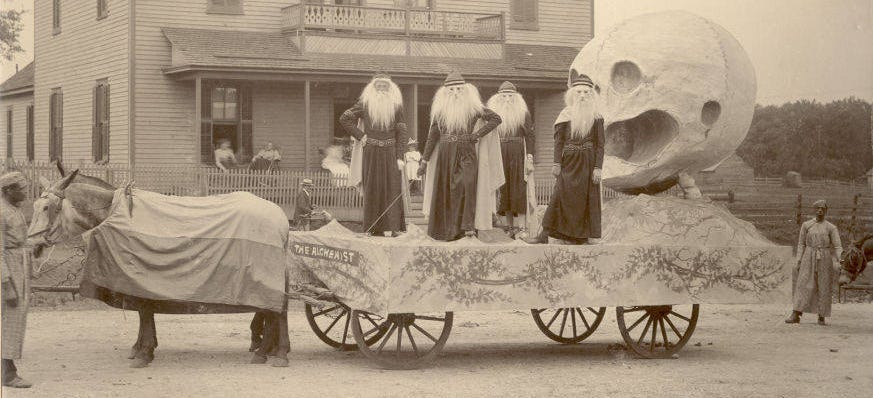Hi there,
This week is about our human need to connect, because it’s cold out, the future is still more uncertain than usual and I’m reading Brené Brown with our weekly book club (details below)! Let’s get cracking.
February is often called as the coldest month in the northern hemisphere, but given the popularity of Mardi Gras carnivals around the Christian world, it may be the rowdiest!
Groundhogs likely retreated this year, especially in Texas
Legend met reality when groundhogs peered out of their holes on February 2nd and probably rushed back in, smelling the upcoming cold fronts that have recently hit parts of Europe and the United States, as far south as the state of Texas. Texas is called The Lone Star state because it loves to shun federalism and court self-sufficiency - the famous Texan do-it-alone independence. Texas likes to connect with Texas.
In the recent years, Texas’s stand-alone stance has been tested by extraordinary natural disasters - extraordinary in the literal sense of the word - out of the ordinary, once-in-a-century events. Now outlier events happen several times per decade.
This February, deadly winter storms took down the state power grid causing blackouts that deprived Texans of electricity and heating while boil advisories* were in place. People have died from the cold in their beds, cars and yards.
It is important to realize that there are three power grids in the United States: the eastern one, the western one, and the Texas power grid created to dodge or avoid federal regulations. On this “electricity island”, infrastructures and prices are deregulated and strictly based on supply and demand. Electricity cannot be imported or exported. The Texan vision of self-reliance makes it an outlier as well.
Meanwhile, next door in Louisiana, Mardi Gras was on the line.
Sunken Hopes
Mardi Gras, or Fat Tuesday, was on Februrary 16th this year. Before many of these parades were canceled, crowds of revelers had hoped to rush the streets to celebrate the end of winter and mark the beginning of Lent*.
The Mardi Gras countdown begins months in advance when social organizations called krewes and specialized businesses carefully design and build floats. Floats are elaborate, eye-catching displays mounted on some means of transport - from horse-drawn carts back in the day to gigantic moving platforms with lots of high-tech features. Their fabrication and design rely on multidisciplinary teams of floatbuilders who cover everything from hydraulics and pyrotechnics to props and live performances. They appear to float above the ground, hence the name.
Float fever was nearly sunk, however, when New Orleans had to cancel its Mardi Gras parade which would have created a super-spreader event. But this cross-cultural and multilingual city was not to be defeated.
How to Break Rules Without Breaking Them
Throughout the ages, the human species has sought to connect and belong, to be part of a greater whole that aspires to provide stability, protection, social and other opportunities. We also have been wise and institutionalized, or ritualized, our need to disconnect from rules and constraints of social contracts. Does this explain in part the power and popularity of carnival traditions across the world?
They give us the opportunity to anonymously step out of normalcy as we engage in satire without consequences through floats, masks and costumes. It is (relatively) safe to dance, feast, drink and parade down the streets with friends and strangers. We’re free to connect differently.
Not willing to give up on the holiday made to break rules, the city of New Orleans, one of the best-known Fat Tuesday capitals of the world, turned the situation around by going from street floats to house floats.
House floats
This year, floats remained stationary and crowds traveled to see them. The idea is astonishingly simple: turn facades and front yards* into colorful, artistic - and immobile - floats. House floats allow merrymakers to social distance, visit in small groups or follow the itineraries from the safety of their cars.
Mardi Gras was renamed to Yardi Gras.
In the meantime, here is another example of pandemic-driven creativity striving to connect people, this time in Singapore.
The Safe Bubble, or Making the Most Out of the Rules
While Yardi Gras is about a temporary break from the rules, a new business hotel in Singapore is about compliance - seamless compliance. You may think I am comparing apples to oranges but this juxtaposition showcases our complex need for connection.
A pilot hotel has managed to provide a safe and contained environment for international and local business travelers to connect and conduct business through a highly controlled “test-stay-work-meet” ecosystem. After a negative Covid test, international travelers are transferred to/from the hotel/airport and enter what can be described as a fairly exquisite hotel bubble reducing physical contact to a minimum.
Meetings can take place behind air-tight glass panels, meals are delivered to the rooms and guests have access to gym pods, vending machines and a “lush garden” to relax in, among other amenities and services. Despite the whiff of science fiction, this environment does its utmost to safely connect business people in uncertain times.
Data- and people tracking are at the core of this kind of business and they’re high stake issues sure to remain so in the coming years. Inequalities around the world will prolong travel restrictions; data tracking and collection of all sorts will be a prerequisite for international, “face -to-face” connection. Even the language has changed. Live meetings were like live concerts - being there - not to be confused with a “Zoom live.”
Metadata, Traces of Ourselves
We leave traces or metadata wherever we go, online and off - just think of archeology and trade routes! Getting dressed-up and changing our appearance is woven into our origins and dates back to thousands of years. Something about wearing a mask and hiding our facial features, or putting on an Italian suit, allows us to embody a new identity and set of behaviors.
Metadata is defined by Wiktionary as data that describes other data, serving as an informative label. For example: Most websites contain metadata to tell the computer how to lay out the content on the screen*. Santa’s metadata tells us his beard is white and that he is warm, generous and beloved.
We can’t escape metadata: your business suit and language express trust and credibility, even more so when your picture and its metadata are online.
Another key point about meta: it is self-referential and infinite. A song about a song, a book about a book, and if a genie grants you three wishes, you may make a meta wish by wishing for infinite wishes.
We use the Internet to enhance and feed our need for connection. Depending on the context, much like carnival or a serious business meeting, we take on avatars, pseudonyms and brand ourselves. Virtual suits and masks.
But when it comes to virtual social play and collaboration, online gaming communities are forerunners. They are not only effective places for the younger generation to learn English but also perfect environments to design virtual identities.
Metahumans
Metadata lets us define metahumans where technology gives us the power to create infinite human likenesses. I urge you to watch the video. I found it more chilling than thrilling, but if I played role play games, I’d probably enjoy slipping into one.
Metahumans are terribly impressive, yet, I hope you’ll agree, something is off. How will this technical breakthrough affect us? At some point, metahumans will break out of gaming communities and step into “real world” transactions.
In a sterile world, could a metahuman could be your mask as you dance at an international online carnival, or kindly take over your Zoom self as you leisurely get a coffee? Could my metahuman help me be a better English language coach? How about if you had to quarantine in your hotel room and instead sent your healthy metahuman on a video conference with the other guests? Robots are different but they somewhat feel needy and passé in comparison.
How would you feel about your own properly designed metahuman and its connecting potential?
Thanks for reading and listening. See you next week.
Maude Vuille
www.languagesandmore.com
Links and idioms
*a boil advisory: the need to boil house water before using or consuming it
*Lent: In Christian traditions, Lent is the 40-day period of fast between Ash Wednesday and Easter. It easily blends in with non-religious traditions celebrating the end of winter sobriety and ushering in spring joy and renewal.
*front yard: the American English term for front lawns/gardens
English Book Club - René Brown’s The Gifts of Imperfection - enjoy great conversation once a week to perfect your English skills and read a good book. Last-minute booking until 23 February: https://learn.ohyes.ch/courses/step-up-book-club-january-2021/preview
A groundhog in February: https://unsplash.com/@rkatieb
Vintage Mardi Gras Procession photographs
The Alchemists Float
Vintage Mardi Gras Processions and Crowds
It was a sunny day - umbrellas are out. On the left, hatted young men climbed up the utility pole to get a better look!
A Modern Float
www.connectatchangi.sg : Language-wise, the website below is beautifully written and I would urge you to read through it as a business English exercise. Read it aloud for even better practice.
Metadata on Wiktionary: https://en.wiktionary.org/wiki/metadata
Metahuman:















